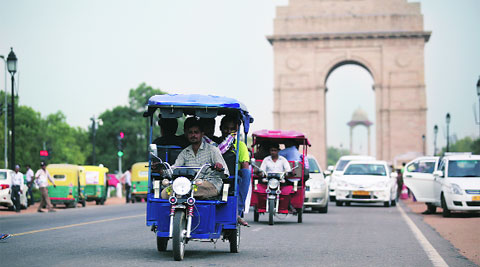 Though there is no data on e-rickshaws, Transport department says there are nearly one lakh e-rickshaws in the capital. (Source: IE photo by Tashi Tobgyal)
Though there is no data on e-rickshaws, Transport department says there are nearly one lakh e-rickshaws in the capital. (Source: IE photo by Tashi Tobgyal) Union Transport Minister Nitin Gadkari’s announcement of a special scheme for e-rickshaws last Tuesday has given a boost to these battery-operated vehicles, which have already replaced cycle-rickshaws in most areas and are slowly inching out auto-rickshaws.
With Gadkari coming out in support of e-rickshaw drivers, these three-wheelers have been ensured a free run with a proper policy yet to be worked out by the municipal corporations.
The new scheme — Deen Dayal e-rickshaw scheme — will allow e-rickshaws to operate without any testing to ensure basic quality standards. Also, Traffic Police can no longer fine them.
From China to Chandni Chowk
“No case can be registered against e-rickshaws and no challan can be issued as these battery-operated vehicles do not fall under the category of motor vehicles,’’ a traffic police officer said.
But all this has done little to dampen the popularity of these vehicles, which are proliferating by the day outside Metro stations, malls and colonies.
“Unlike a cycle rickshaw, a family of four can travel comfortably in an e-rickshaw. I no longer have to take my car to go to the market,’’ Radhika Singh, a resident of East Delhi, said.
AAP, BJP & Cong scramble to take up e-rickshaw cause
Auto unions have sought a meeting with Gadkari to ask him to limit these battery-operated vehicles to colonies.
“They will create a traffic nuisance otherwise. Also, how have the poor benefitted from the relief given to e-rickshaws owners and drivers? It is the cycle rickshaws drivers who need relief. Government should give e-rickshaws to them and take steps to prevent the formation of a cartel,’’ Rajinder Soni of the Bharatiya Mazdoor Sangh said.
Fare and cost of vehicle
The traffic hazards caused by e-rickshaws have been a cause for concern for a while now. A study by The Energy and Resources Institute (TERI) — done on the request of the Delhi government — had recommended that these battery-operated vehicles be kept off the main roads. A difficult ask, considering that this is the only mode of shared transport in the city which doesn’t hurt the pocket.
“We charge Rs 10 each passenger for distances between 2 km and 5 km. There are no fixed charges. Each association has its own fare.
For instance, if someone needs to go from Tilak Nagar to Punjabi Bagh, we would charge them Rs 100,’’ Gurmeet Singh of Khalsa Battery-Operated E-rickshaw Union, said.
Compare these charges to auto-rickshaw fares, which were last hiked in May 2013. A commuter has to shell out a minimum fare of Rs 25 for the first 2 km and Rs 8 for each additional kilometre.
Fares apart, the cost of auto-rickshaw is double that of an e-rickshaw. While an
No comments:
Post a Comment